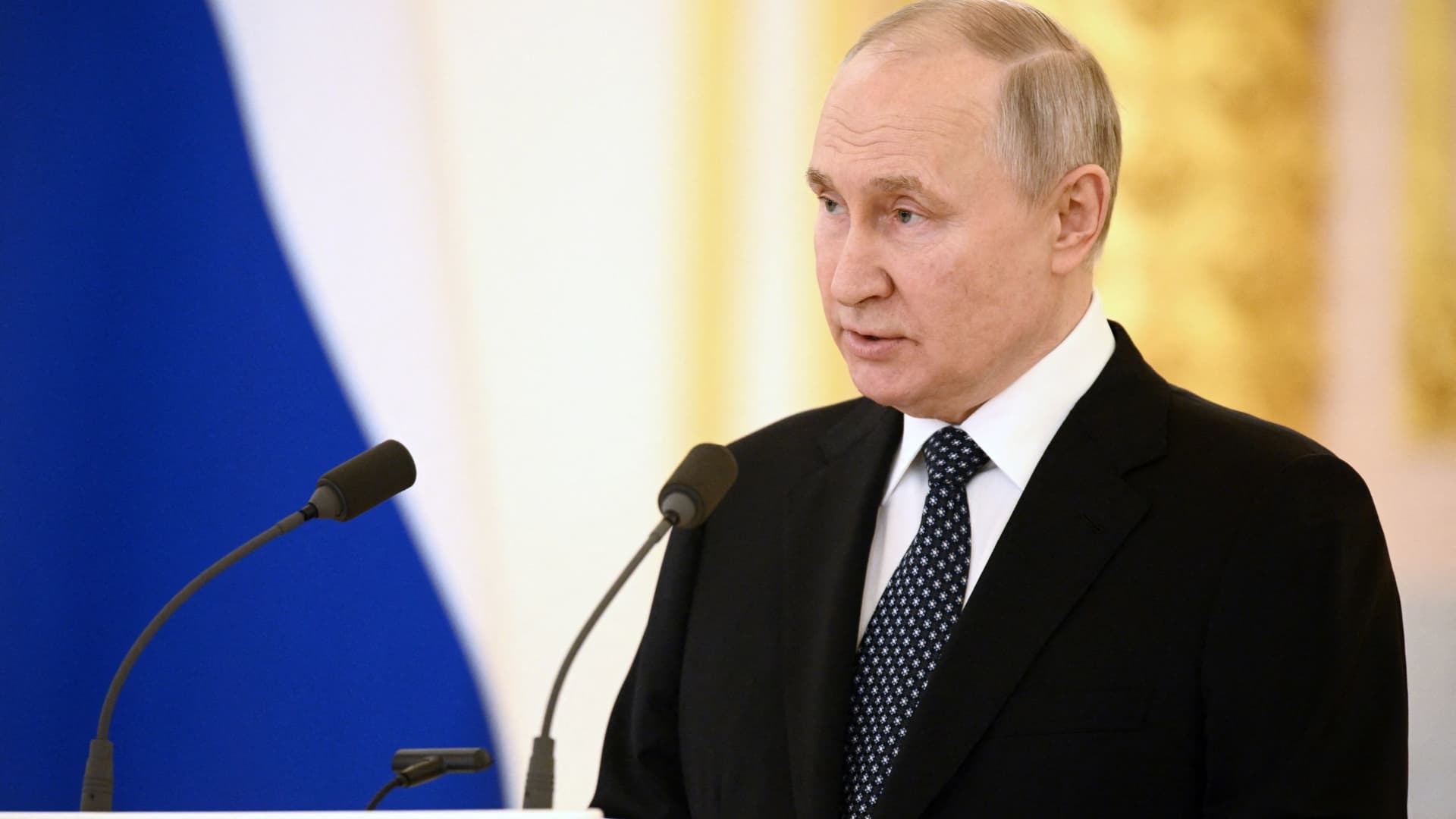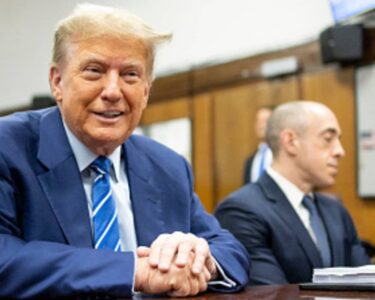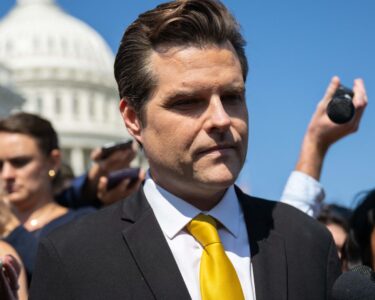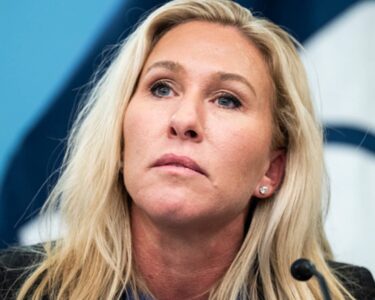This has been CNBC’s live blog covering updates on the war in Ukraine. [Follow the latest updates here.]
Ukrainian President Volodymyr Zelenskyy and first lady Olena Zelenska arrived in Poland for an official visit Wednesday, marking another rare trip abroad for Zelenskyy as the war continues back home.
Zelenskyy will hold talks with Polish President Andrzej Duda and Prime Minister Mateusz Morawiecki and discussions will focus on security policy as well as “economic cooperation, political dialogue and historical issues,” the Polish government said.
Zelenskyy and Duda are due to make a joint speech at the Royal Castle in Warsaw this evening.
On Wednesday, Russian President Vladimir Putin is set to hold talks with his Belarusian counterpart, with a deepening of defense cooperation and strategy likely top of the agenda.
If Beijing further supports Russia in its war against Ukraine, that could affect trade relations between Europe and China, said Jens Eskelund, vice president of the EU Chamber of Commerce in China.
Ursula von der Leyen, the president of the European Commission, will be in Beijing alongside France’s President Emmanuel Macron this week.
“I think both of the leaders will impress upon the Chinese leadership that right now everything is being viewed through the lens of Ukraine,” he told CNBC “Squawk Box Asia.”
“It should not be underestimated — the potential impact it could have also on European-China trade — if we see further expressions of support from China for Russia in its aggression against Ukraine. This point will be made clear.”
— Sumathi Bala
The White House said it has seen no indication that China has agreed to provide Russia with lethal weapons for Moscow’s war in Ukraine.
“We haven’t seen any indication that they’ve provided lethal weapon capabilities to Mr. Putin. And look for us, it’s actions, not words,” National security council spokesman John Kirby said on a call with reporters.
“We’re just gonna keep watching it and monitoring it,” he said, declining to speculate on any potential U.S. retaliation if Beijing provided support to Russia.
— Amanda Macias
Russia’s commissioner for children’s rights, who was named in an arrest warrant by the International Criminal Court, countered claims during a U.N. meeting that Moscow is deporting Ukrainian children.
Maria Lvova-Belova, who spoke via video link, addressed some of the 15 members of the U.N. Security Council. U.S. Ambassador to the U.N. Linda Thomas-Greenfield did not attend the briefing, nor did her British counterpart. Lvova-Belova’s remarks come as Russia takes over the rotating presidency of the U.N. Security Council.
Last month, the International Criminal Court issued arrest warrants for Russian President Vladimir Putin and Lvova-Belova over alleged war crimes committed in Ukraine.
Putin and Lvova-Belova are “allegedly responsible for the war crime of unlawful deportation” of children from occupied areas of Ukraine to Russia, the court wrote in a statement.
— Amanda Macias
Secretary of State Antony Blinken called for the immediate release of detained Wall Street Journal reporter Evan Gershkovich and former U.S. Marine Paul Whelan.
“In my own mind, there’s no doubt that he’s being wrongfully detained by Russia, which is exactly what I said to Russian Foreign Minister [Sergey] Lavrov, when I spoke to him over the weekend and insisted that Evan be released immediately,” Blinken said during a press briefing at NATO headquarters in Brussels, Belgium.
Gershkovich was detained by Russian authorities on espionage allegations.
Blinken added that the State Department is working through the determination of a wrongful detention process.
“It’s something that we’re working through very deliberately, but expeditiously as well. And I’ll let that process play out,” he said.
Blinken also noted that the U.S. proposed a deal “some months” ago to Russia for the release of Whelan.
Whelan was arrested in 2018 on charges of acting as a spy for the United States. At the time he was arrested, Whelan was visiting Russia to attend a wedding, according to his brother, David Whelan.
— Amanda Macias
Russian President Vladimir Putin placed the blame squarely on the United States for the ongoing war in Ukraine.
“Relations with Russia and the United States, on which global security depends, are in a deep crisis unfortunately,” Putin said in a speech at the Kremlin.
Putin said that the U.S. support “for the coup in Kyiv in 2014 led to today’s crisis in Ukraine.” He added that the U.S. is responsible for contributing to the degradation of bilateral relations between Moscow and Washington.
“We have always been in favor of building relations between our countries on the principle of equality and respect for sovereignty and each other’s interests and the interference in each other’s methods. We will be guided by that approach in the future,” Putin said.
— Amanda Macias
President Joe Biden’s ambassador to the United Nations said the U.S. “will use every opportunity to push back” should Russia misuse its temporary role as president of the Security Council.
“I just wanted to take the opportunity again to say, as Russia takes on the presidency of the Security Council, we will use every opportunity to push back on their using their perch in the chair to spread disinformation and to use their chair to push support of their efforts,” U.S. Ambassador to the U.N. Linda Thomas-Greenfield told reporters.
She also said that she spoke with her Russian counterpart on Tuesday regarding the immediate release of detained Wall Street Journal reporter Evan Gershkovich.
Earlier in the week, Thomas-Greenfield said that the U.S. expects Russia to “carry their presidency in a professional way.”
Russia assumed the presidency, which rotates each month among the 15 Security Council members, over the weekend. Russia is one of the five permanent members of the U.N. Security Council and therefore holds veto authority on any measure proposed before the international forum.
— Amanda Macias
The Kremlin said Finland’s ascension to the NATO alliance “creates an additional threat” for Russia.
“Of course, this is an event that does not contribute to the strengthening of stability, security and predictability on the European continent. This creates an additional threat for us and it obliges us to take the necessary measures to re-balance the entire security system,” Kremlin spokesman Dmitry Peskov told reporters in Moscow.
“Everything that is necessary to ensure our safety will be done,” he added, declining to provide further details.
— Amanda Macias
Polish President Andrzej Duda welcomed Ukraine President Volodymyr Zelenskyy during a welcoming ceremony at the presidential palace in Warsaw.
— Getty Images
Ukrainian President Volodymyr Zelenskyy thanked the Biden administration for providing an additional $2.6 billion in security assistance.
The latest military assistance package, the 35th such tranche, brings U.S. commitment to more than $35.1 billion since Russia launched its full-scale invasion of Ukraine.
“The U.S. is providing a $2.6 billion defense support package. Ammunition for HIMARS, for air defense, for artillery is just what we need,” Zelenskyy said in an address, translated by NBC News.
“Thank you Mr. President Biden, thank you Congress, thank you every American,” he added.
— Amanda Macias
Ukraine heartily congratulated Finland on its accession to NATO, with President Volodymyr Zelenskyy saying Helsinki now had a “reliable guarantee of safety — a collective guarantee.”
But as Finland’s flag was hoisted at NATO’s headquarters in Brussels on Tuesday, officially marking its entry as the 31st member of the Western military alliance, there were bound to be bittersweet feelings in Kyiv.
Ukraine yearns for NATO membership, having long aspired to join the alliance and for it to feel the security that members enjoy as a result of the collective defense pact.
At the heart of NATO is the tenet that an attack on one member is an attack on all members. If that tenet, enshrined in Article 5, is invoked, then all members are bound to come to the defense of that member country.
Ukraine knows that its own journey toward that “guarantee of safety,” as Zelenskyy described it, faces far more barriers to entry, however.
Read more on the story here.
Spain’s Defense Minister Margarita Robles told state broadcaster TVE that six of its Leopard 2 tanks will be dispatched to Ukraine in the second half of April.
The German-made tanks are currently being tested for proper functioning, she said. Robles added that Madrid will not be sending combat aircrafts, as it does not possess the model requested by Kyiv.
Spain had briefly mulled increasing the number of tank deliveries to Ukraine to 10, Reuters reported in late February, citing Prime Minister Pedro Sanchez.
Other NATO countries, including Germany, Portugal and Poland, announced they will be sending their own Leopard 2 tanks to Ukraine earlier this year, following Berlin’s protracted late-January U-turn on giving permission for such dispatches.
— Ruxandra Iordache
French President Emmanuel Macron, who is carrying out a state visit in Beijing, said that China can play a role in resolving the war in Ukraine, given its relationship with Russia, according to Reuters.
China has been attempting to position itself as a mediator in the conflict, releasing a 12-point peace proposal on the one-year anniversary of the war. Beijing’s plan has yet to gain traction.
China enjoys its own tumultuous relationship with the west in matters of trade, which Macron signaled should be resolved.
“We have to somehow de-risk our industries … but we must not disassociate and separate ourselves,” he said in comments reported by Reuters.
— Ruxandra Iordache
Ukraine’s President Volodymyr Zelenskyy and first lady Olena Zelenska arrived in Poland for an official visit Wednesday.
Zelenskyy’s Press Secretary Serhii Nikiforov said on Facebook that the visit includes talks with Polish President Andrzej Duda and Prime Minister Mateusz Morawiecki and the “signing of bilateral documents” without giving further details.
The Polish government released a statement in which it said the leaders will discuss security policy as well as “economic cooperation, political dialogue and historical issues.”
Zelenskyy will also meet with representatives of Polish business, lawmakers and volunteers and rescue workers, as well as with mayors of cities bordering Ukraine.
Zelenskyy and Duda are due to make a joint speech at the Royal Castle in Warsaw this evening.
— Holly Ellyatt
Russian President Vladimir Putin is set to hold talks with his Belarusian counterpart Aleksandr Lukashenko in Moscow on Wednesday and Thursday, with the deepening of defense ties on the agenda.
The leaders are due to discuss progress in developing the “Union State,” a union between Belarus and Russia aimed at deepening economic and defense cooperation, as well as “the security concept of the Union State,” Belarusian news agency BelTA reported.
Lukashenko and Putin are expected to hold a bilateral meeting on Wednesday to discuss “the international situation and security measures” and import substitution, as both countries look to minimize the pain of international sanctions, as well as the “development of high-tech industries.”
Analysts at the Institute for the Study of War said Tuesday the Kremlin “will likely attempt to coerce Belarus into further Union State integration” when the leaders meet on April 5 and 6, with intelligence sharing also a possible area of integration.
“The Kremlin may pressure Belarus for more integration concessions under the rubric of defending the Union State from claimed Western military and/or terrorist threats,” the ISW said.
Belarus has been a staunch, albeit subordinate, ally to Russia throughout the war, though it hasn’t actively participated in the conflict on the ground in Ukraine. It has allowed Russian troops to launch assaults on Ukraine from its territory, however, and last month Russia announced it would station tactical nuclear weapons in Belarus, saying this was at Lukashenko’s request.
— Holly Ellyatt
“Finland now has the strongest friends and allies in the world,” NATO’s Secretary-General Jens Stoltenberg said Tuesday as he welcomed the Nordic nation into the fold of the Western military alliance.
He said he’s “deeply proud” to welcome Finland into NATO, making the country its 31st member, adding that “at times like these, friends and allies are more important than ever” as the alliance continues to wrestle with support for Ukraine as its war with Russia rages on Europe’s doorstep.
Before Russia invaded Ukraine last February, it sent a list of proposals to the alliance, calling on it to roll back its deployments of troops and weapons to Eastern Europe, and for it to guarantee that Ukraine would never become a member of the group.
Russia has long objected to NATO’s expansion but its war in Ukraine has only made the group more desirable for European countries close to Russia which are outside the group.
Finland, which shares around 800 miles of land border with Russia, had enjoyed decades of military nonalignment but applied to apply to join the military alliance fearing an aggressive, seemingly expansionist Russia on its border.
With Ukraine watching Finland’s fast-tracked entry to the alliance, and with Sweden likely to follow, Stoltenberg said the door remains open to prospective members, though he didn’t mention Ukraine by name.
“President Putin wanted to slam NATO’s door shut. Today, we show the world that he failed.
Instead of less NATO, he has achieved the opposite. More NATO. And our door remains firmly open.”
— Holly Ellyatt
There was bound to be a bittersweet feeling in Kyiv yesterday as Finland joined the military alliance NATO after a fast-tracked accession process, given that Ukraine has also applied but faces far more barriers to entry.
Those include not only the fact Ukraine is in an active ongoing war with Russia but also a likely reluctance among some members who have warmer relations with Moscow (such as Turkey and Hungary) to antagonize Russia further at a time when relations between NATO and Russia are already dire.
Ukraine’s President Volodymyr Zelenskyy said Russia’s aggression against his country shows that only collective preventive security guarantees, like those offered by member of the NATO military alliance, are “reliable.”
Speaking in his nightly address Tuesday, after Finland became the 31st member of NATO after decades of military nonalignment, Zelenskyy said it was an historic event for “the whole of Europe, for the entire Euro-Atlantic community.”
Congratulating Finland, Zelenskyy said Finland now has a “reliable guarantee of safety – a collective guarantee.”
“Russian aggression clearly proves that only collective guarantees, only preventive guarantees can be reliable. That’s what we’ve always talked about. They also talked about speed – the speed of security decisions matters. Now we see what the speed of procedures can be,” Zelenskyy said.
Finland and Sweden both applied to join NATO last May, prompted by Russia’s invasion of Ukraine, and their membership bids were fast-tracked. Sweden is still waiting for its bid to be ratified by Turkey and Hungary.
— Holly Ellyatt
Emma Tucker, the editor-in-chief of The Wall Street Journal and Dow Jones newswires, said that Evan Gershkovich’s lawyers were able to meet with him in a Moscow prison.
The lawyers, retained by Dow Jones, said that Gershkovich is “grateful for the outpouring of support from around the world.”
“The legal avenue is one of several avenues we are working to advocate for Evan’s release. We continue to work with the White House, State Department and relevant U.S. government officials to secure Evan’s release,” Tucker wrote in a statement.
Tucker added that she spent time with Gershkovich’s family over the weekend.
“They are relieved to know we finally have contact with Evan. We continue to stand with Evan’s family as they face this ordeal,” Tucker said.
“I am also grateful for all of our colleagues at Dow Jones and peers in journalism who stand firmly by our side to defend Evan and the free press,” she added.
Gershkovich was arrested last week by Russian authorities over espionage allegations.
— Amanda Macias
White House press secretary Karine Jean-Pierre called the charges against Wall Street Journal reporter Evan Gershkovich ridiculous.
“Evan is not a spy. Evan has never been a spy. Evan has never worked for the U.S. government and he is an independent journalist employed by the Wall Street Journal,” Jean-Pierre said during a daily White House briefing.
Jean-Pierre added that Gershkovich’s case is “a priority for this president.”
Over the weekend, Secretary of State Antony Blinken spoke to Russian Foreign Minister Sergey Lavrov about Gershkovich’s detention and called for his immediate release. Blinken also called for the release of former U.S. Marine Paul Whelan.
Whelan was arrested in 2018 on charges of acting as a spy for the United States. At the time he was arrested, Whelan was visiting Russia to attend a wedding, according to his brother, David Whelan.
— Amanda Macias
The Biden administration approved a new security assistance package for Ukraine worth $2.6 billion.
The latest military assistance package, the 35th such tranche, is valued at $500 million and comes directly from U.S. arsenals. The remaining $2.1 billion is funded by the Pentagon’s Ukraine Security Assistance Initiative.
Since Russia launched its full-scale invasion of Ukraine last year, the U.S. has provided more than $35.1 billion in support.
The capabilities in the $500 million package are:
“Russia alone could end its war today. Until Russia does, the United States and our allies and partners will stand united with Ukraine for as long as it takes,” Blinken wrote in a statement.
— Amanda Macias
Finland on Tuesday became the 31st member of NATO, wrapping up a historic strategic shift with the deposit of its accession documents to the alliance.
— Getty Images
Finland officially became a member of the Western military alliance NATO, ending decades of military nonalignment.
On Tuesday, the Nordic country’s accession document was handed to U.S. Secretary of State Antony Blinken in Brussels, where NATO foreign ministers are gathered until Wednesday.
Earlier. NATO Secretary-General Jens Stoltenberg said it was a “truly historic” day as he welcomed Finland into the alliance.
Russia, which shares around an 800-mile border with Finland, said the expansion of NATO increases the risk of conflict with Moscow and warned it would take “countermeasures to ensure our own security both tactically and strategically.”
Finland’s president, Sauli Niinisto, released a statement saying “the era of military non-alignment in our history has come to an end. A new era begins” saying membership in the alliance “provides security for Finland. Finland, on the other hand, provides security for the Alliance.”
He said Finland’s membership “is not targeted against anyone” and that it remains “a stable and predictable Nordic country that seeks peaceful resolution of disputes.”
Niinisto also called for Sweden’s membership bid to be formally accepted, with NATO members Hungary and Turkey yet to ratify its accession.
“Finland applied to join NATO together with Sweden. Finland’s membership is not complete without that of Sweden,” Niinisto said.
“The persistent efforts for a rapid Swedish membership continue. Similarly, close cooperation continues to build common security and defence across the Nordic region.”
— Holly Ellyatt
With Finland set to formally become a member of NATO on Tuesday, Russia said the accession of a new member (and one it happens to share an 800-mile border with) increases the risk of conflict with Russia.
The Kremlin’s spokesperson Dmitry Peskov said Tuesday that Finland’s accession to NATO “is another aggravation of the situation” calling it an “encroachment on our security and the national interests of the Russian Federation, we talked about this and this is how we perceive it,” Peskov said, Russian news agency RIA Novosti reported.
Elsewhere, Russian Defense Minister Sergei Shoigu said NATO was “strengthening its anti-Russian course, which leads to an escalation of the conflict,” as he spoke with Russian military officials Tuesday.
Shoigu remarked that the West was increasing its military assistance to Ukraine in the form of tanks and armored vehicles but signaled that Russia was strengthening its own arsenal, saying that some Belarusian military jets are now capable of carrying nuclear warheads.
Last month, Russia announced it would deploy tactical nuclear weapons to Belarus. Shoigu noted Tuesday that Iskander rocket systems, which can be used to carry conventional or nuclear missiles, had been transferred to Belarus.
Shoigu said Russia had started training the Belarusian troops on how to use the missile system “for the defence of the Union State.” The “Union State” refers to Russia and Belarus’ cooperation in a number of areas including economic and defense policy.
— Holly Ellyatt
Finland officially becomes the 31st member of NATO; Russia warns it will take ‘countermeasures’






